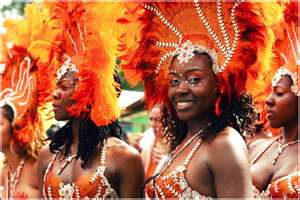KENDAL SQUARE, CAMBRIDGE, MA, Sept. 10 - Exactly one week after gun-violence rocked working-class Brooklyn, New York annual famed West Indian Carnival (apparently, a firing range), during which at least 49 people were wounded, untold number of them taken out of the circulation, plus one elderly lady who was sent to the dark embrace of death while sitting on a stoop, the 2011 Cambridge, Mass. Caribbean Carnival, though far smaller in scale, which commenced, with people in elaborate costumes designed only for the rare festivity marching as musical bands playing the best of their songs, at around 12 p.m., today, in Central Square-dominated widely recognized nightclubs, in the city of the same name, rather, as anticipated, ended peacefully, around 7 p.m., a few blocks away, in wealthy Kendall Square, the assigned ultimate perimeter (about 6 blocks) for the grand event, which, according to four Cambridge police officers in white shirts, signaling high rank, attracted about 35,000 people of all sexual orientations, races and ages - the latter, young, middle age, and those of pensionable age.
Photo may be copyrighted. Caribbean musical bands - from as far as Honduras, Jamaica, New Orleans, and New York City - were observed performing. Participants, many of them dressed in lavish carnival costumes, were incessantly dancing as others, too, could not refrain themselves from doing the same and consuming, apparently with great pleasure, Caribbean foods and soft drinks.
But there were a few others who frequently visited the portable toilets, where, for certain, they could not be observed, also by a contingent of Massachusetts Institute of Technology (M.T.I.) and Massachusetts Bay Transportation Authority (M.B.T.A.) police officers helping with security, consuming a large quantity of alcohol distilled at a high proof and as a resulted be deprived of their liberty, because consumption of alcohol, by law, is prohibited in public outdoor areas except those immediately outside the Bar/Pub or drinking establishment.
If the vast majority of participants were there solely to amuse themselves, but there were a few other ones, all men, who, apparently, could not refrain themselves from looking at the half-nude many Caribbean women dancers.
Many of the 28 Cambridge police officers - a number provided to Wehaitians.com by an officer in position of responsibility - on duty (one of the two accounting costs incurred by the city; the other, that of trash removal, in the immediate aftermath), sure, too, did not have to wait for one of the spectacular events in the Greater Boston area, which first started in 1992 as a small street fair at nearby University Park, to then transport themselves somewhere else to consume some food.
Especially, on the eve of 9/11, the 10th anniversary of the unprecedented attacks on the crowded World Trade Center twin towers, in New York City, and the Pentagon, in Washington, D.C., the police were visibly completely unrestrained in their capacity to provide full security. Sure must they be commended for so.
When asked to convey her thoughts about the heavy police presence, one elderly lady, walking with the help of a cane, without hesitation philosophically responded "Hopefully, next year history will repeat itself," giving also a man she proudly identified only as her son the impression that the question was instead paused to Karl Marx.
A large number of Haitians, as is costmary, were, too, in attendance for the very especial circumstance. But their cuisine, music and arts, unfortunately, were nowhere to be found, giving many, including two young women who only identified themselves as M.I.T. students, the impression that as a people they had disappeared from the face of the earth.
So unhappy he was about the lack of Haitians formal participation in the annual public reveling, longtime Cambridge Area 4 resident and activist, Rocky Jeanty, had a few words of advice for his fellow Haitian compatriots.
"The presence of a Haitian band here today, including that of those who are in the food business, the arts business, you name it, would sure be a rare opportunity for us, Haitians, to market what sure defines us as a people." A sentiment echoed by many others, largely very young Haitian-Americans, as their voices trembled in anger.
For many middle age Haitian-Americans and those of other age categories, however, "It is time for us, Haitians, to make the cultural ghetto we are self-confined in a thing of the past, and that is one of the best few ways we can, with certitude, compete with other ethnic groups. Otherwise, forget about it."
"You go to a Haitian party, only Haitians are there;" they added, "you go to a Haitian funeral, only Haitians are there. That is not acceptable, especially for a visible minority group of people like us who have long established residence in the state of Massachusetts. Of particular importance, an undetermined number of us are U.S. citizens, by naturalization. Hopefully, next year will be an integral part to of the carnival, a remedy to the collateral damage that we continue to sadly witness until today."
